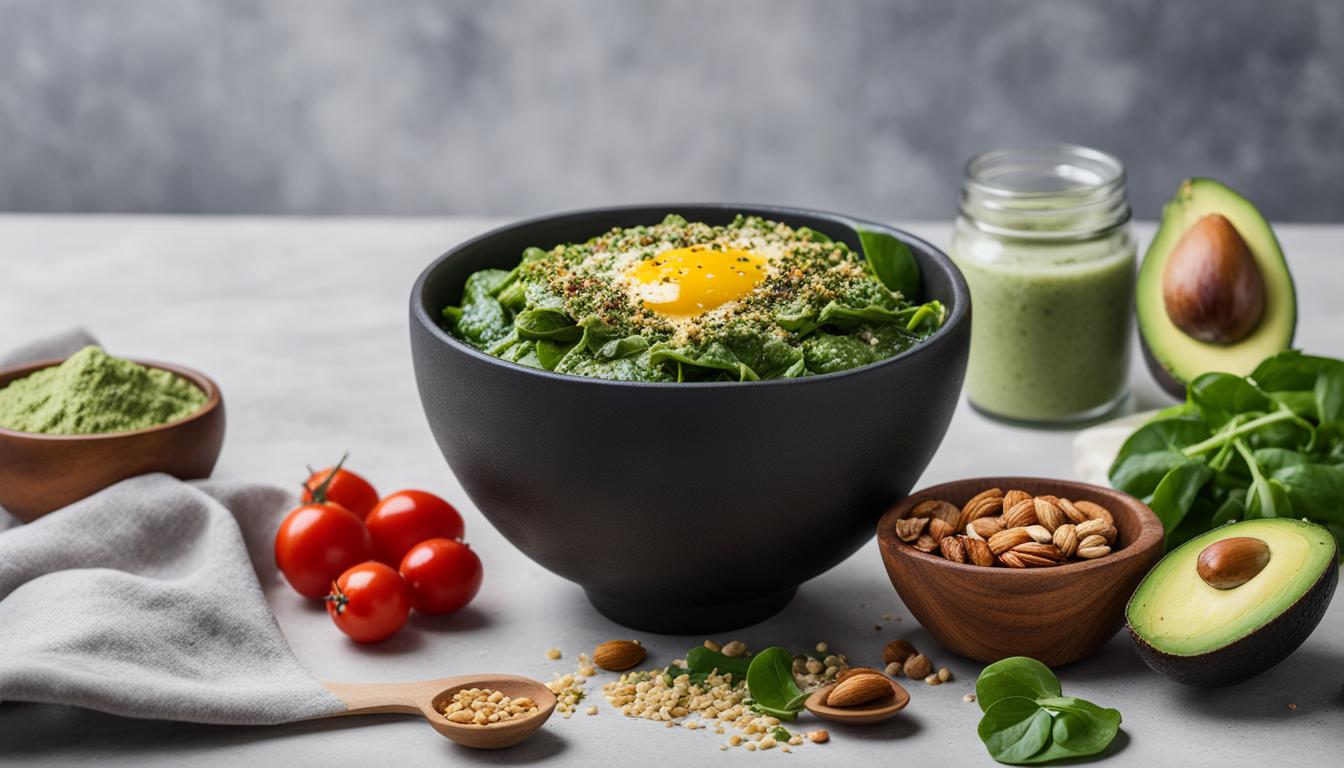Discover the Ultimate Vegetarian Keto Diet Plan: Weight Loss and Health Benefits Explained!
Understanding the Keto Diet and its Popularity
Hey there, keto warriors! Let’s dive into the incredible world of the ketogenic diet, better known as the keto diet. This high-fat, low-carb diet has been gaining immense popularity over the years, especially among individuals seeking to achieve weight loss and numerous health benefits.
So, what exactly is the keto diet, and why is it so beloved? Well, here’s the lowdown: The keto diet is designed to induce a state of ketosis in your body. This metabolic state occurs when your carbohydrate intake is significantly reduced, leading your body to utilize fat as its primary fuel source. As a result, your body becomes incredibly efficient at burning fat for energy, which can lead to weight loss, increased mental clarity, and improved energy levels.
One of the primary reasons for the keto diet’s surge in popularity is its remarkable effectiveness in aiding weight loss. Scientific research has shown that following a ketogenic diet can lead to greater weight loss compared to traditional low-fat, calorie-restricted diets. Additionally, the keto diet has been found to be particularly beneficial for individuals with insulin resistance, PCOS, and even neurological disorders like epilepsy.
Moreover, the vegetarian approach to the keto diet has attracted an ever-growing community of health enthusiasts. By modifying the standard keto diet to exclude meat and fish while prioritizing plant-based fats and proteins, vegetarians can also relish the wonderful benefits of ketosis while aligning with their dietary preferences.
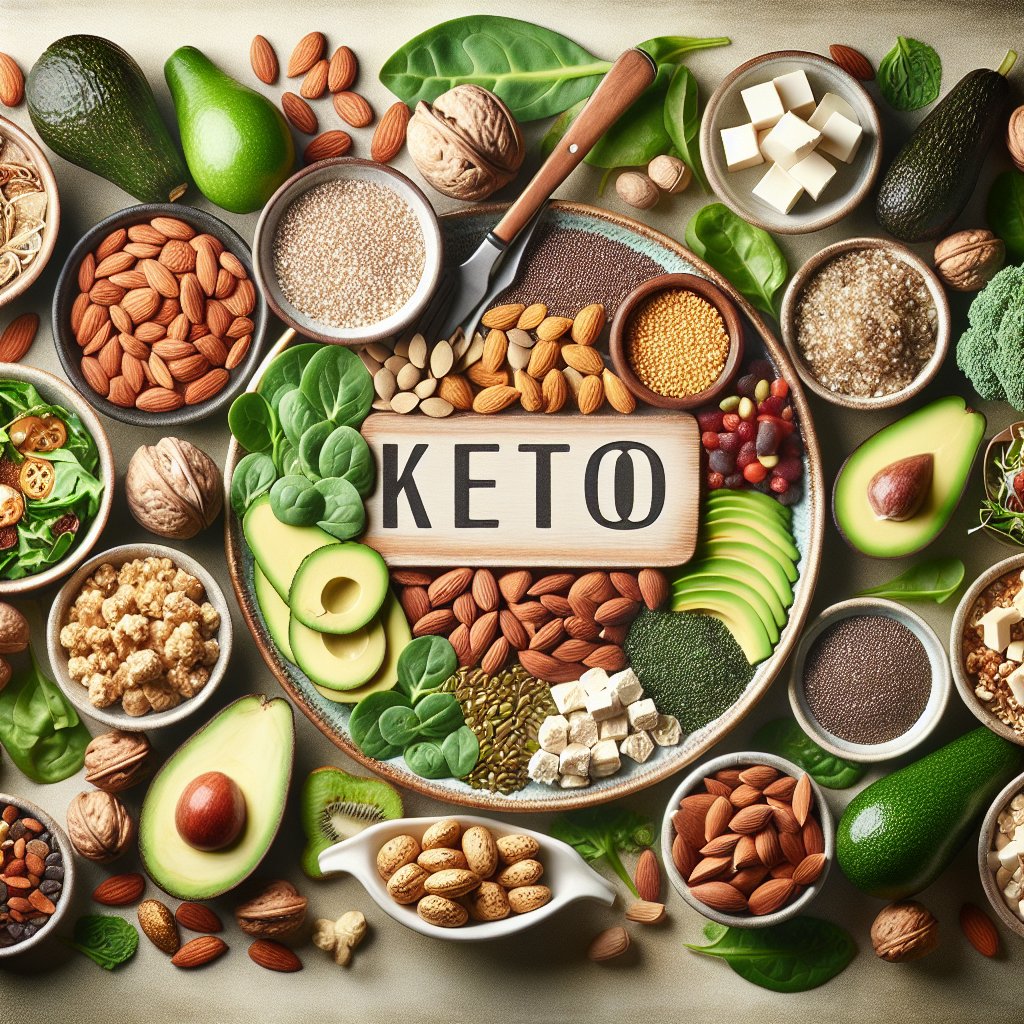
What is a Keto Diet?
If you’re new to the world of ketogenic diets, you might be wondering what all the buzz is about. Well, let me break it down for you! The keto diet is a low-carbohydrate, high-fat eating plan designed to put your body into a state of ketosis. This means that your body shifts from using glucose as its primary fuel source to burning fat for energy.
When you consume very few carbs and a higher amount of healthy fats, your liver produces ketones, which are molecules that fuel your brain and body in the absence of glucose. This metabolic state offers a myriad of benefits, including weight loss, improved mental clarity, and increased energy levels.
Principles of the Keto Diet
The principles of the ketogenic diet are rooted in drastically reducing your carbohydrate intake while increasing your consumption of fats. By doing so, you push your body into a state of ketosis, where it becomes incredibly efficient at burning fat for fuel.
Following a keto diet means focusing on whole, nutrient-dense foods like avocados, nuts, seeds, and healthy oils. These foods are not only delicious but are also high in healthy fats and low in carbs, making them perfect for keeping your body in ketosis.
How Keto Works for Weight Loss
Now, let’s talk about the exciting part – how the keto diet promotes weight loss! Research has shown that ketogenic diets can be highly effective for weight loss. A study published in the International Journal of Environmental Research and Public Health found that individuals following a ketogenic diet experienced significant reductions in body weight and body mass index (BMI) after 12 weeks.
When you limit carbohydrate intake, your body enters a state of ketosis, leading to a significant reduction in appetite and hunger hormones. Additionally, the increase in fat consumption helps you feel satiated, leading to a natural reduction in calorie intake. The combination of these effects can lead to substantial weight loss while still allowing you to enjoy delicious, satisfying meals!
Vegetarianism and Keto Diet
Are you a vegetarian interested in reaping the benefits of the ketogenic diet? You’re in the right place! Contrary to the popular belief that keto is all about bacon and butter, the truth is that vegetarians can also thrive on this low-carb, high-fat diet.
So, how can vegetarians follow a ketogenic diet? By focusing on plant-based fats, proteins, and low-carb vegetables!
Plant-Based Fats
Plant-based fats are a crucial component of the vegetarian keto diet. Sources of healthy plant-based fats include avocados, nuts, seeds, and oils such as olive oil and coconut oil. These fats provide the essential fatty acids and micronutrients needed for overall well-being. Research conducted by the Harvard T.H. Chan School of Public Health has shown that replacing saturated fats with unsaturated fats, especially those from plant sources, can lead to a lower risk of heart disease.
Proteins
Protein is essential for a well-rounded vegetarian ketogenic diet. For vegetarians, protein sources include eggs, dairy products such as Greek yogurt and cheese, and plant-based options like tofu, tempeh, and edamame. These protein sources not only support muscle maintenance and repair but also help in keeping you feeling full and satisfied. According to a study published in the Journal of the International Society of Sports Nutrition, a high-protein diet can aid in weight loss, muscle preservation, and improved body composition.
Low-Carb Vegetables
Low-carb vegetables are rich in fiber, vitamins, and minerals, making them an excellent choice for the vegetarian keto diet. Leafy greens, broccoli, cauliflower, zucchini, and bell peppers are just a few examples of low-carb veggies that can be incorporated into your meals. These vegetables not only add variety and flavor to your diet but also contribute to better digestive health and overall well-being. A study published in the American Journal of Clinical Nutrition emphasizes the importance of consuming a variety of colorful vegetables for optimum health benefits.
By focusing on these plant-based fats, proteins, and low-carb vegetables, vegetarians can seamlessly adhere to a ketogenic diet and enjoy its numerous health benefits.
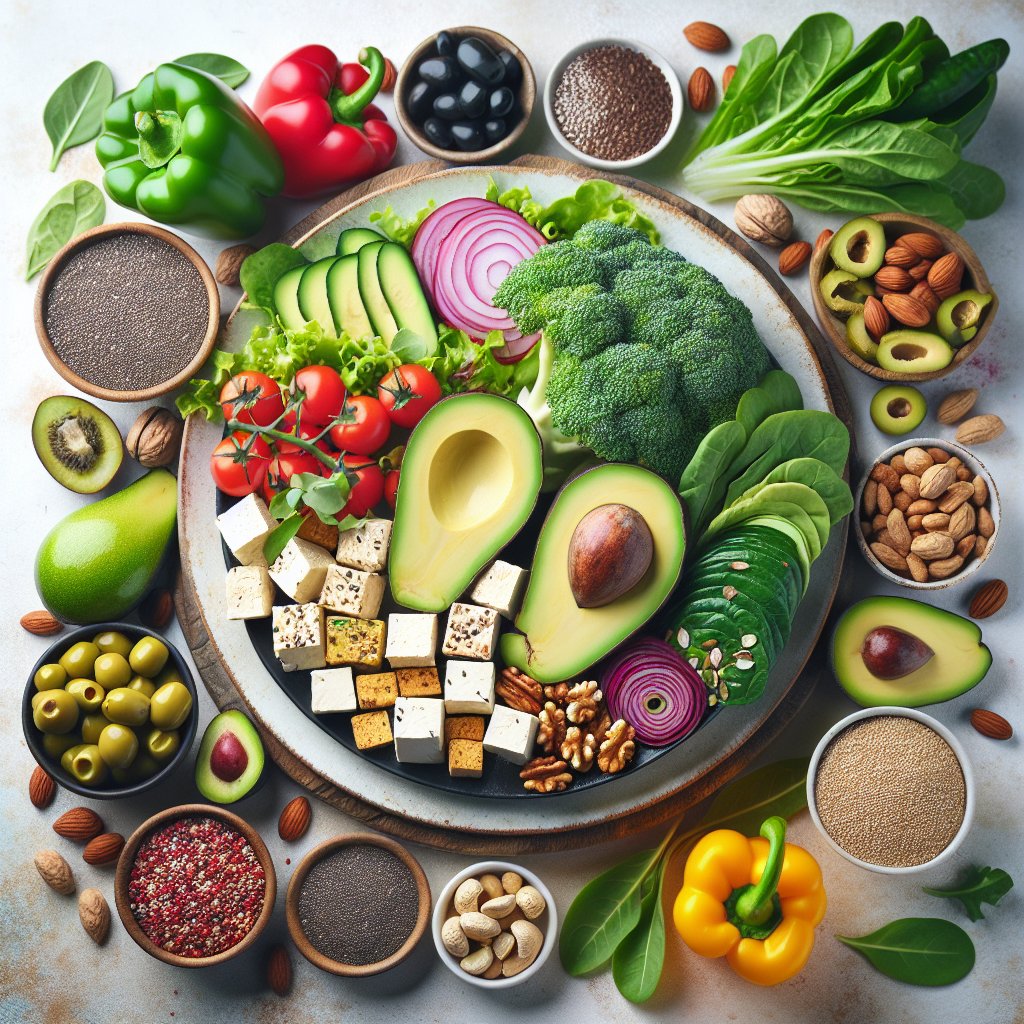
Benefits of Keto Diet for Vegetarians
Following a vegetarian keto diet can bring about a myriad of health benefits that go beyond just weight management. Science shows that this diet can lead to significant improvements in various aspects of health, making it a great choice for those looking to optimize their well-being.
Weight Loss
Research published in The British Journal of Nutrition has indicated that individuals on a vegetarian keto diet tend to experience greater weight loss compared to those following a traditional low-fat diet. This is attributed to the body’s utilization of fat stores for energy, leading to more effective weight management.
Improved Blood Sugar Control
For individuals with diabetes or those at risk of developing the condition, a vegetarian keto diet can offer substantial benefits. Studies in the American Journal of Clinical Nutrition have shown that this diet can lead to improved blood sugar control, making it an effective dietary approach for managing and preventing diabetes.
Increased Energy Levels
One common misconception about the keto diet is that it may lead to a lack of energy due to reduced carbohydrate intake. However, a study in the Journal of the International Society of Sports Nutrition found that individuals on a well-formulated vegetarian keto diet experienced enhanced physical endurance and sustained energy levels, making it beneficial for active individuals seeking to improve their performance.
With weight loss, improved blood sugar control, and increased energy levels being just a few of the potential health benefits, the vegetarian keto diet is a compelling option for those looking to enhance their overall well-being.
List of Vegetarian-Friendly Foods for a Ketogenic Diet
Following a vegetarian ketogenic diet doesn’t mean you have to compromise on flavor or variety. In fact, there’s an abundance of delicious and nutrient-dense foods that are suitable for your dietary lifestyle.
Nuts and Seeds
Nuts and seeds are fantastic sources of healthy fats, protein, and essential minerals. They include almonds, walnuts, chia seeds, flaxseeds, and pumpkin seeds. These can be eaten as snacks, added to salads, or incorporated into a variety of keto-friendly recipes.
Avocados
Avocados are a staple in the vegetarian keto diet. They are rich in monounsaturated fats, which are heart-healthy, and also provide a good amount of fiber. You can enjoy avocados in salads, smoothies, or simply as a creamy and satisfying snack.
Tofu
Tofu is a great source of protein for vegetarians on the keto diet. It’s versatile and can be used in stir-fries, curries, or as a meat substitute in various dishes. Tofu is low in carbs and a valuable addition to a vegetarian keto meal plan.
Leafy Greens
Leafy greens such as spinach, kale, and Swiss chard are packed with essential vitamins, minerals, and antioxidants. They are also low in carbs, making them ideal for a vegetarian keto diet. You can incorporate these greens into your meals by sautéing, making salads, or adding them to soups and smoothies.
Incorporating these foods into your vegetarian keto diet plan provides a diverse and nutrient-rich approach to eating, ensuring that you receive the essential nutrients while staying in ketosis.
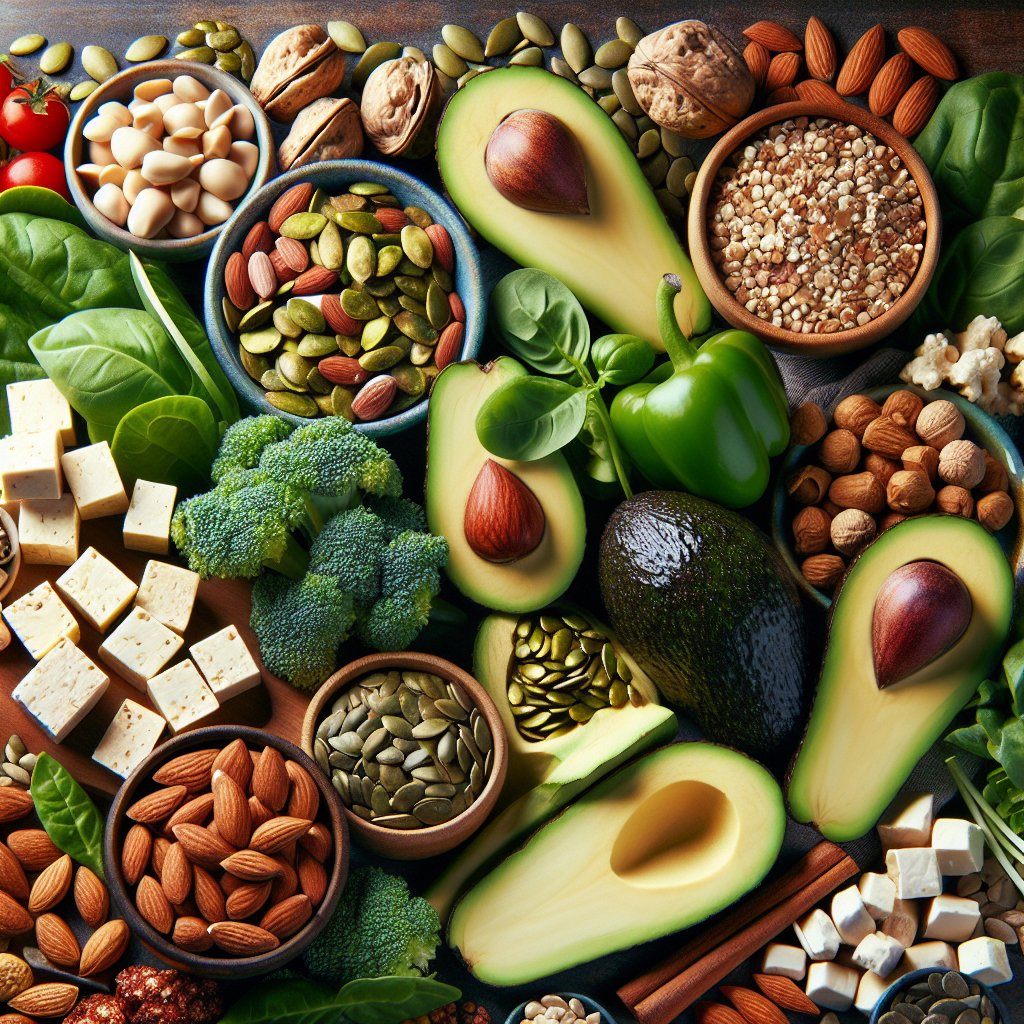
Foods to Avoid on Vegetarian Keto Diet
When following a vegetarian keto diet, it’s essential to be mindful of the foods that should be limited or avoided to stay in a state of ketosis. While a vegetarian keto diet primarily focuses on plant-based foods and healthy fats, certain items can hinder your progress.
Grains
Grains such as wheat, rice, and oats are high in carbohydrates, which can disrupt ketosis. Instead, opt for low-carb alternatives like cauliflower rice or almond flour in moderation.
Starchy Vegetables
Starchy vegetables like potatoes, sweet potatoes, and parsnips are culprits for high carbohydrate content. However, you can still enjoy vegetables like zucchini, spinach, and kale, which are low in carbs and packed with nutrients.
High-Sugar Fruits
Fruits are generally healthy, but some are high in sugar and can elevate blood glucose levels. It’s best to limit fruits such as bananas, mangos, and grapes. Instead, choose avocados, berries, and other low-sugar options for a sweet but keto-friendly treat.
By being mindful of these foods, you can maintain the metabolic state of ketosis while enjoying the benefits of a vegetarian keto diet.
Sample Vegetarian Keto Meal Plan
Following a vegetarian keto diet doesn’t have to be bland or restrictive. In fact, it can be deliciously satisfying and nutritionally balanced. Here’s a one-day sample meal plan to get you started on your vegetarian keto journey.
Breakfast: Avocado and Eggs
Start your day with a nutrient-packed breakfast. Whip up a delicious avocado and eggs combo. Avocado is a fantastic source of healthy fats and fiber, while eggs provide high-quality protein and essential nutrients. Simply slice the avocado, remove the pit, and crack an egg into the center. Bake in the oven until the egg is cooked to your liking.
Lunch: Greek Salad with Tofu
For lunch, enjoy a refreshing Greek salad with a twist. Load up on leafy greens, diced cucumbers, cherry tomatoes, kalamata olives, and feta cheese. Substitute the traditional feta with tofu for a protein-packed vegetarian option. Drizzle with olive oil and sprinkle with oregano for a burst of flavor.
Snack: Cheese and Veggies
When the mid-afternoon munchies strike, reach for a satisfying snack of cheese and crunchy vegetables. Pair your favorite type of cheese with cucumber slices, cherry tomatoes, or bell pepper strips. This snack provides a dose of calcium, protein, and vitamins to keep you fueled until dinner.
Dinner: Cauliflower Crust Pizza
Satisfy your pizza cravings with a vegetarian keto-friendly cauliflower crust pizza. Load it with vibrant veggies like bell peppers, onions, spinach, and olives. Top with a generous sprinkle of mozzarella and bake until the crust is crispy and the cheese is bubbly. This guilt-free pizza will leave you feeling full and content.
Remember to stay hydrated throughout the day by drinking plenty of water, herbal teas, or naturally flavored sparkling water. Additionally, feel free to customize the meal plan to suit your taste preferences and dietary needs.
Whether you’re a long-time vegetarian looking to explore the benefits of the keto lifestyle or a keto enthusiast searching for meat-free options, this sample meal plan offers a tasty and satisfying way to navigate the vegetarian keto diet.
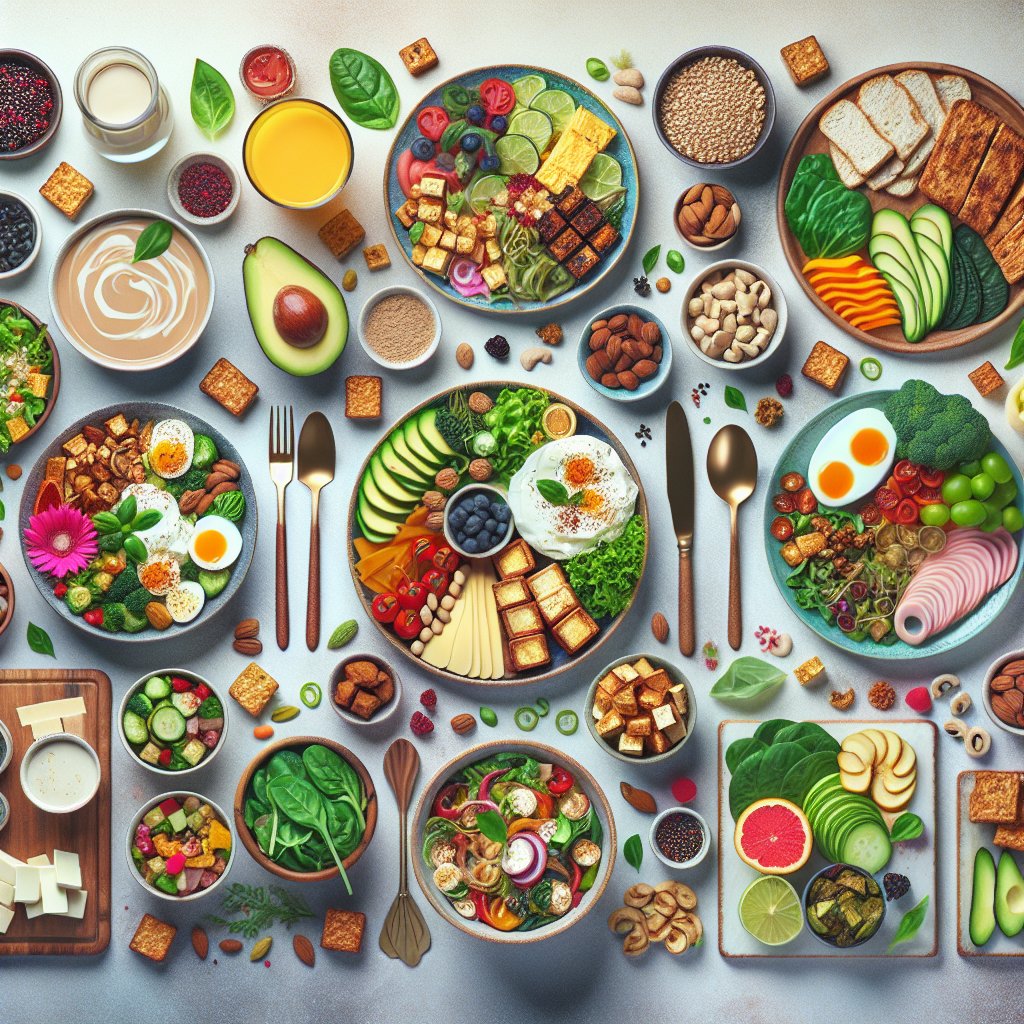
Potential Risks and Considerations
Embarking on a vegetarian keto diet can bring about fantastic health benefits, but it’s crucial to be aware of the potential risks and considerations that come with it. Understanding these possible hurdles can help you navigate the diet successfully.
Nutrient Deficiencies
One of the primary concerns when following a vegetarian keto diet is the risk of nutrient deficiencies. Research has shown that individuals on a vegetarian diet may have lower intake of essential nutrients such as vitamin B12, iron, zinc, and omega-3 fatty acids. This is especially relevant in the context of a ketogenic diet, where certain plant-based sources of these nutrients may be restricted due to their carbohydrate content. To mitigate this, it’s important for individuals on a vegetarian keto diet to carefully plan their meals to ensure they are obtaining adequate amounts of these critical nutrients. Incorporating foods such as chia seeds, flaxseeds, hemp seeds, algae oil, nuts, seeds, and leafy greens can help address some of these concerns.
Adherence Challenges
Adhering to a vegetarian keto diet may present some unique challenges, particularly when dining out or socializing. Many traditional vegetarian staples such as fruits, starchy vegetables, and grains are restricted on a keto diet. This can make it challenging to find suitable options in certain situations. Additionally, the emphasis on high-fat foods in a keto diet may go against the conventional wisdom of a low-fat vegetarian approach, leading to potential psychological hurdles for some individuals. To navigate these challenges, it’s essential to have a solid understanding of keto-friendly vegetarian foods and to plan ahead when dining out or attending social events. Developing a support network of like-minded individuals can also be invaluable in maintaining motivation and commitment to the diet.
Overall, while the vegetarian keto diet offers numerous benefits, it’s important to be mindful of potential nutrient deficiencies and adherence challenges. With thoughtful planning and a proactive approach, these considerations can be effectively managed, paving the way for a rewarding and sustainable dietary journey.
Offering Practical Tips for Vegetarian Keto Diet Success
Following a vegetarian keto diet can be a rewarding and beneficial lifestyle choice. However, it’s essential to approach it in a well-informed and balanced manner. Here are some practical tips for successfully following a vegetarian keto diet:
1. Meal Planning
Meal planning is crucial for ensuring a diverse and nutritious vegetarian keto diet. Incorporating a variety of low-carb vegetables, healthy fats, and plant-based proteins is essential for meeting your nutritional needs. Consider planning your meals for the week ahead, and don’t shy away from experimenting with new vegetarian keto recipes.
2. Tracking Macros
Monitoring your macronutrient intake is a fundamental aspect of the keto diet. For vegetarians, this involves paying close attention to sources of protein and ensuring an adequate intake of healthy fats. Utilize various apps and tools that can help track your daily macro intake to ensure you’re staying within the appropriate keto ranges.
3. Seeking Professional Guidance
Consider seeking guidance from a nutritionist or dietitian who is knowledgeable about the vegetarian keto diet. They can offer personalized advice, ensure you’re meeting your nutritional requirements, and help address any concerns or challenges specific to a vegetarian keto lifestyle.
Remember, a well-rounded vegetarian keto diet should prioritize nutrient-dense, whole foods to promote overall health and well-being.
It’s crucial to note that individual dietary needs vary, and professional guidance can provide tailored recommendations for a balanced and sustainable vegetarian keto diet plan.
Summarizing the Key Points about the Vegetarian Keto Diet
Before we wrap up, let’s recap the key points about the vegetarian keto diet. It’s a low-carb, high-fat diet that aims to put the body in a state of ketosis, where it burns fat for fuel. While traditional keto diets often rely on meat, the vegetarian version emphasizes plant-based foods and healthy fats. This way, you can enjoy the benefits of ketosis while honoring your vegetarian lifestyle.
Potential as a Sustainable and Effective Dietary Approach for Vegetarians
So, does the vegetarian keto diet hold potential as a sustainable and effective dietary approach for vegetarians? Absolutely! Research has shown that both the ketogenic diet and vegetarian diets individually offer numerous health benefits. When combined, they can create a powerful synergy.
Studies have found that vegetarian diets are associated with lower levels of obesity, reduced risk of heart disease, lower blood pressure, and a decreased risk of developing type 2 diabetes. On the other hand, the ketogenic diet has demonstrated significant weight loss, improved insulin sensitivity, and enhanced cognitive function.
When these benefits are combined, the vegetarian keto diet presents an exciting opportunity for vegetarians to achieve weight loss, improve metabolic health, and enhance overall well-being. It offers a way to enjoy the benefits of a keto lifestyle while following a plant-based diet.
Moreover, the vegetarian keto diet is not just about short-term weight loss; it can be a sustainable lifestyle choice. By focusing on nutrient-dense, whole foods, and healthy fats, this type of eating can provide the body with essential vitamins, minerals, and antioxidants, while supporting long-term health and vitality.
One of the key advantages of the vegetarian keto diet is its flexibility. With a wide variety of plant-based foods to choose from, you can create diverse and delicious meals that keep you satisfied and nourished. The abundance of colorful vegetables, leafy greens, nuts, seeds, and plant-based protein sources allows for a rich and fulfilling culinary experience.
In conclusion, the vegetarian keto diet has the potential to be a sustainable and effective dietary approach for vegetarians. With its emphasis on whole, plant-based foods and the numerous health benefits associated with both the ketogenic and vegetarian diets, it offers a promising way to improve health, lose weight, and embrace a lifestyle that’s not just about short-term results, but long-term well-being.


